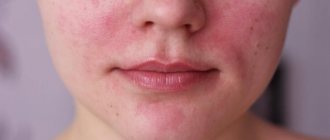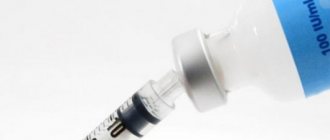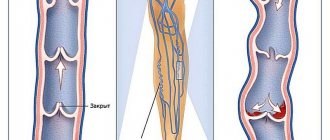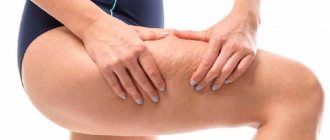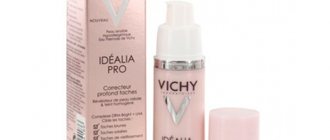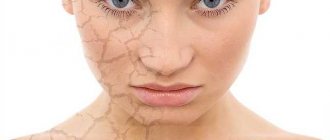The skin of your hands is constantly exposed to negative conditions. In winter, just forget your gloves and the frost will quickly take its toll. In summer, our hands suffer from the bright sun. But it’s women’s hands that get the most, most often they are in the water, and everyday housework is clearly not doing them any good. Contact with our salt-saturated water leads to accelerated dehydration of the skin, and in combination with other factors, the situation can become much worse. So why does the skin on your hands turn black and what types of spots can appear on the skin?
The pads of the fingers are peeling. Fingertips are peeling - treatment
If the skin on your fingers peels off and no care measures help, then you should analyze whether there are enough nutrients in your diet, or have you gone overboard with the diet?
Maybe it’s worth changing the daily menu - introducing more vegetables, fruits, nuts, salads with vegetable oils, and losing extra pounds through exercise? You can switch from a regular diet to a fractional diet, add vitamin complexes. A consultation with a physician is necessary - metabolic disorders or endocrine diseases can only be identified after special examinations. Of course, when treating illnesses, you shouldn’t give up taking care of yourself, but you may need to change cosmetics if allergic reactions occur.
If the cause of deterioration in the quality of the skin on the hands is dermatological diseases of various etiologies, then temporarily you will have to abandon cosmetic procedures and products and focus on treatment.
The causes of psoriasis and eczema have not yet been clarified; factors influencing the development of diseases include: unhealthy heredity, internal organic pathologies, somatic diseases, and unstable emotional state. Treatment is symptomatic. During exacerbations, medicinal ointments and creams are applied to the hands, and cosmetics must be put aside for a while.
During therapeutic measures aimed at eliminating the infectious nature of dermatological diseases, hand care activities should also be temporarily stopped.
This should not be scary - modern drugs help to quickly cope with the problems that arise.
To eliminate scabies mites, it is enough to treat your hands for 24 hours. If the skin on the fingertips peels off due to a fungus, then once the unpleasant symptoms – abscesses and hyperemia of the skin – are eliminated, you don’t even need to give up a manicure in the future. Modern remedies for fungus - special varnishes - can be applied under decorative coatings. Fungal diseases take a long time to treat, but thanks to the latest generation of medications, a woman will not have to feel complex about having an unkempt brush.
General recommendations for treating hand skin:
- if the condition worsens, avoid contact with water and household chemicals;
- if it is impossible to avoid contact with detergents, then it is necessary to use personal protective equipment - wear gloves;
- before using creams or other skin care products, first do allergy tests - apply the substance to the crook of your elbow and after 30-40 minutes analyze whether irritation has appeared;
- at the first symptoms of deterioration - the beginning of peeling - take antihistamines.
Women whose professional activities have a deteriorating effect on their hands - hairdressers, doctors, etc. – you need to strengthen your skin care measures: purchase a cream with a thicker consistency, go to a beauty salon for medical and cosmetic treatments.
Symptoms of eczema
The main symptom of eczema is the presence of inflammation of the surface of the skin, with a tendency to grow, with weeping areas, and itching of the affected area. The acute stage of the disease almost always becomes chronic, with periods of temporary improvement and exacerbation. Occupational and microbial eczema are the most difficult to treat; they are characterized by the fact that in the acute stage, small blisters form on the skin of the hands, reminiscent of boiling water, which gives this disease the name “boiling”. The chronic stage of eczema is characterized by the fact that the affected area of the skin thickens, the edges of the wound become rough, and itching or burning is constantly felt.
The very common dry eczema on the fingers looks somewhat different; there is practically no itching, the tips of the fingers are covered with flaky skin, and cracks often form on them. The skin thickens, sensitivity is lost, and pain is pronounced. It becomes impossible to do the simplest work, wash your hands or prepare food. This type of eczema affects people whose professional activities involve the use of chemicals.
The skin on the child's fingers is peeling off. Why does the skin peel off on my child’s fingers?
Often, parents may notice that the child’s skin is peeling off on his fingers. This is not surprising, because it is thinner and more sensitive than in adults. The reasons for this phenomenon are varied - from stress to disease.
Why does the skin on a child's fingers peel off?
Such peeling, doctors note, can be asymptomatic or accompanied by itching and the appearance of small blisters. You shouldn’t sound the alarm right away - you need to remember how the child felt in recent days, what he did and ate. Among the common reasons for this phenomenon are the following.
- Allergy. A child may have a reaction to strawberries, honey, eggs, citrus fruits, etc. Sometimes allergies to unsuitable washing powders and cosmetics occur.
- Exfoliative keratolysis. It usually appears in spring and summer. It is characterized by the appearance of one or more air-filled blisters on the skin of the palms or fingers. Such formations open and leave round, oval or mesh lesions of the skin. Provoking factors can be chemicals, sweat, friction, and lack of vitamins.
- Avitaminosis. Lack of A and E leads to peeling.
- Infectious diseases. This is already a more dangerous reason. Fungus, lichen or scabies require immediate medical attention.
- Stress. The child's psyche is less stable than that of an adult. Violation of the emotional background can lead to problems with the skin - for example, it begins to peel off on the fingers.
- Scarlet fever. Another infectious disease that can affect the condition of the skin. Peeling appears both during and after recovery.
- Contact with an irritating substance. If a child gets their hands into something but then quickly washes or wipes them off, the contact may still have an impact. These can be the same cleaning or chemical products. Based on the child's hands, it will be possible to determine the zone of their influence. In severe cases, the skin may not exfoliate, but may actually peel off.
Disease prevention and skin treatment
If parents are unable to quickly and independently identify the reason why the skin on the child’s fingers has begun to peel off, then it is necessary to consult a doctor. Without a proper diagnosis, treatment will be meaningless. It will be worse if the situation is neglected - due to complications, the skin will peel off more and more. If the doctor has not identified any diseases, then you can help the child at home. First of all, it is necessary to change all cosmetics with which it comes into contact. It is best to choose ones that do not contain dyes, flavors or chemicals. It is also worth improving your baby’s nutrition: adding more foods with vitamins A, E, C and D to his diet. It is worth remembering that the condition of the skin is affected by the weather: wind, frost, heat. And dry air in the room can affect it. Therefore, the affected areas need to be lubricated with creams for recovery - Bepanten, Radevit and Boro Plus are suitable. All of the above remedies can be used only after consultation with a specialist. It is important to remember this, because we are talking about the health of the child.
Medicines for cracks
If the skin on your hands is cracking, you can’t let the situation get worse. Otherwise, further elimination of the problem will be greatly complicated by possible infection.
determine the true reason why the skin began to roughen, darken or turn yellow in the area of the bones or elbows after a complete examination of the patient. So, if such a phenomenon occurs due to a lack of vitamins and minerals in the body, a specialist will select the optimal course of taking a vitamin-mineral complex that will help cope with the problem.
If cracks appear due to the development of an allergy to an external irritant, then you should start taking antihistamines. Citrine, Tavegil, Suprastin are perfect for this. The sore should be treated only after the irritant itself has been eliminated. These remedies will help relieve itching and speed up healing.
To eliminate severe damage, you need to use local remedies. They will also be appropriate when the wounds begin to heal and itch. In this case, the possibility of repeated scratching and injury to the skin is reduced.
The skin on the tips of your fingers will peel off. Causes of peeling hands
It is very difficult to determine why the skin on the hands peels off for a person without appropriate knowledge in the world of medicine. It is much wiser to seek diagnosis from a dermatologist. If you don’t have the opportunity to visit a doctor, then you can try to understand why the skin on your fingers is peeling off by carefully examining the surface of the limbs. The skin on the hands peels off, usually due to a lack of vitamins of a certain group. Vitamin deficiency can be recognized by the characteristic white lines on the nails.
Vitamins A and E are responsible for the healthy state of the epidermis in the human body. Vitamin C deficiency can also negatively affect the condition of the nails and epidermis. To eliminate skin peeling on your fingers, you need to reconsider your diet. Large amounts of vitamins A and E are found in red fruits and vegetables, vegetable oils, dairy products and eggs. Citrus fruits, cabbage, apples and onions are sources of vitamin C.
The skin on the fingers peels off due to the cold. If a person spends a long time in the cold, the epidermis dries out and peels and peels due to lack of moisture. To eliminate the pathological condition of the epidermis, you just need to lubricate your hands with a nourishing or moisturizing cream before going outside in the winter.
Aggressive cosmetics and detergents cause the skin on your fingers to peel off. The chemical components included in the composition corrode the top layer of cells and can even provoke the formation of ulcers. When cleaning and when using household chemicals, be sure to wear rubber gloves, this will reduce the likelihood of skin peeling.
The skin on the fingers often peels off in older people; this condition is considered normal and does not require drug treatment. In people of retirement age, metabolic processes in the body are disrupted. The epidermis is supplied with an insufficient amount of water, and its cells gradually die off.
Very often the skin on the hands flakes and peels off due to an allergic reaction to some kind of provocateur. They can be food, synthetic gloves, or contact with animal fur. Even the soap you use can have a negative impact. It is very important to promptly determine what causes peeling of the fingers and subsequently avoid contact with the allergen. If the skin peels off due to an allergic reaction, the patient is prescribed sorbents that remove toxins from the body, as well as taking antihistamines such as Tavegil and Suprastin.
If the skin peels off the fingers for a long time, the reasons may be hidden in hormonal imbalance. This condition can be triggered by pregnancy, lactation, menopause, or the use of hormonal contraceptives. In men, fingers on their hands peel due to heavy physical activity and poor personal hygiene. The skin peels off between the fingers of miners, construction industry workers and representatives of other professions who are constantly in dusty rooms.
More serious reasons why the skin on the fingertips peels include:
All of the above provocateurs of peeling require complex treatment and long-term use of targeted medications.
It will be interesting to know that the skin on your finger peels off due to excessive use of detergents. Antibacterial soap can wash away sebum, which normally protects the epidermis from environmental influences. Without this layer, a person's hands become very sensitive to minor damage, fungi, and allergens.
Treatment of eczema
Since the main cause of eczema is an allergic reaction to any product or chemical, treatment must be comprehensive. The patient is prescribed antihistamines, and ointments with glucocorticosteroids have a good effect locally. It is advisable to avoid contact with water; a solution of chlorhexidine or hydrogen peroxide is used to clean the wound. During treatment, it is necessary to exclude from the diet foods that can cause an allergic reaction, even if the person previously ate them. This scheme is designed for a fairly long time, at least fourteen days, and dietary nutrition will be needed for several more weeks.
Treatment of eczema caused by psycho-emotional reasons should include tranquilizers and sedatives, antidepressants, the patient is recommended physical activity and sedative herbs. Herbal medicine is effective in the treatment of eczema of any etiology. Decoctions and infusions of herbs can be used both topically and in the form of tea.
Dry finger eczema is treated by advising the patient not to come into contact with irritating substances until complete recovery, and subsequently to use protective creams and gloves. If the skin of your hands is dry and cracks have formed on your fingers, then silicone gloves for medical procedures have a good effect: they heal sore spots and moisturize the skin. B vitamins are prescribed to improve tissue trophism and faster healing of affected areas.
The skin on the fingers near the nails peels off. Cracked fingers - causes
If you have cracks in your fingers, there can be many reasons for this: from external factors to deeper internal problems.
The mechanism for the formation of cracks on the fingers can be explained quite simply: dehydration of the very surface layer of the skin occurs, as a result of which the epidermis loses its elasticity.
There are several external reasons why the skin on the hands becomes dehydrated and unpleasant cracks appear on the pads and in the folds of the palms.
- The sensitivity of the skin on the fingers next to the nails to absolutely any temperature differences provokes the appearance of cracks. There is also a special type of skin that cannot tolerate any cooling, much less frosty air. The reaction to frost in such cases makes itself felt almost instantly; the symptoms are more reminiscent of an allergy. If no measures are taken within two days, the cracks begin to deepen, turning into painful wounds. Treatment in this case is more complex than with simple chapping.
- Insufficient hand care when there is no protection from the harmful effects of wind, hard water, frost, dust with the help of nourishing creams and optimal clothing.
- Negative effects of household chemicals. The substances used in the production of home cleaning aids - powders, liquids, gels, etc. - are not at all harmless to the skin (and not only). The aggressive effect of household products is aggravated by allergic diseases.
- Mechanical damage to the skin of the hands in combination with exposure to water, wind and lack of skin nutrition.
The skin on the child’s fingers will peel off. Why does the skin peel off on a child's fingertips?
Every pediatrician will tell you why the skin on the fingertips of a child peels off. The fact is that the baby’s immune defense is initially weakened, so many extraneous factors can lead to disturbances. As a rule, the cause of peeling skin on the fingers of children can be associated with various factors and phenomena:
- lack of vitamins in the diet;
- diaper rash;
- fungal infections;
- stress;
- food allergies;
- dysbacteriosis;
- worms.
When the skin on the tips of a child's fingers and toes peels off, parents should not panic. They should contact a pediatrician, who, after diagnosis, will prescribe appropriate treatment methods.
Often young mothers do not trust doctors and want to figure everything out on their own. This is not surprising, so we will look at the most common reasons in more detail.
Allergies
When a child's skin peels off on the pads of his fingers and toes due to an allergy, it can be difficult to discover what exactly is causing the problem. You might have changed your soap or bought a new toy. Anything that the baby has not been in contact with before may contain allergenic substances. Sometimes new objects, including toys and rattles, trigger allergies.
Food allergies to various foods cannot be ruled out. It is important to exclude from the diet everything that you gave your child for the first time. It is likely that the peeling of the skin on the child’s fingers will go away on its own.
Fungal infections
Having discovered how the skin on the fingers of children peels, the cause can be looked for in fungal diseases. In this case, redness and itching additionally occur. You need to see a pediatrician as soon as possible, but don’t even think about choosing antifungal medications for your baby on your own, since there are different types of fungi.
Insufficient amount of vitamins
Lack of vitamins is the third popular reason why the skin on the pads of a child’s fingers peels off. This happens from the age of three years, and to eliminate the disorder you may need to take multivitamin complexes. If there are no serious diseases, the skin condition will return to normal in a matter of days.
Pay special attention to peeling skin on the fingertips of newborns. In the first few weeks, the skin on your hands should gradually renew and peel off. In this case, the baby does not experience any discomfort. This process is completely normal and does not require treatment. You just need to periodically lubricate your fingers with oils and creams for newborns.
The skin on the fingers of a teenager will peel off. Causes of dry skin on fingers, palms and feet
Various reasons lead to problematic skin on a child’s extremities. In infants, the skin on the feet and hands may become rough due to improper care or hypothermia. Babies are very sensitive to changes in the external environment, so hard water often leads to dry skin on the hands and feet.
In older children, the skin may begin to peel and peel due to exposure to wind, water and frost. With frequent contact with water, the skin between the fingers peels off. The lack of vitamins and microelements in the body and dry air in the nursery have an effect. The skin on the fingers, palms and feet flakes and peels as a result of the following reasons:
- Fungal infections of the feet.
- Allergies to food, medications, pet hair, household chemicals.
- Scarlet fever. This is an infectious disease in which the surface of the palms and feet peels off.
- Diseases of the pancreas can manifest as peeling skin on the fingers.
- Worms. Parasites cause damage to the skin in any part of the body.
- Scabies.
- Functional disorders.
- Dysbacteriosis.
- Staphylococcal and streptococcal infections.
- Dermatosis.
The initial stage of psoriasis on the fingers
- Psoriasis. This disease looks like flaky white spots.
- Vesicular infection. Appears on the feet.
- Diabetes. The skin cracks on the tips, pads of the fingers and between them, and when pressed, it bursts.
- Hyperhidrosis of the feet. It usually affects teenagers. Expressed in increased sweating of the feet.
- Herpes zoster.
- Genetic and hereditary diseases.
- Contact injury.
- Chemical, thermal, radiation damage.
- Stress.
- Hormonal imbalances in the body.
- A sharp change in climatic conditions.
- Lack of hydration.
- Incorrect care.
